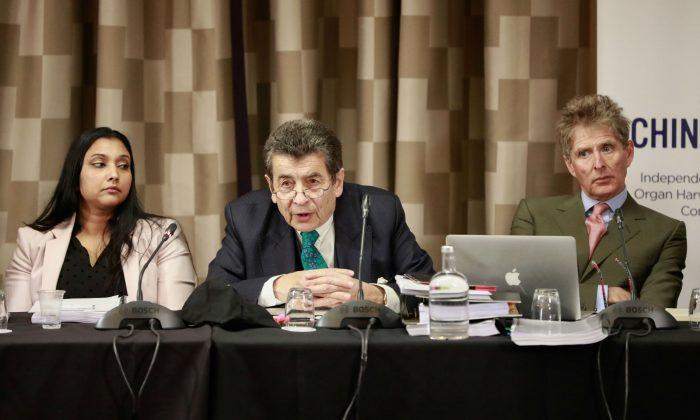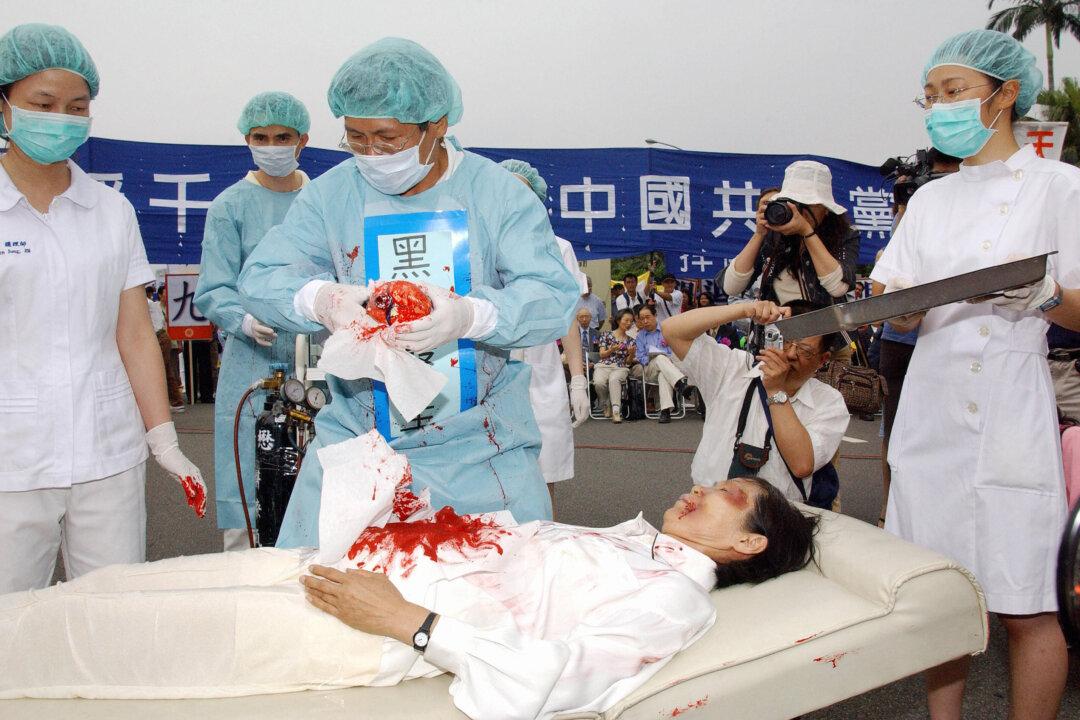Governments and international bodies can no longer turn a blind eye to one of the “worst atrocities committed” in modern times, experts said—as the world’s first independent legal analysis of evidence regarding forced organ harvesting in China concluded that the grisly practice has continued unabated.
The main organ supply came from imprisoned practitioners of the persecuted spiritual group Falun Gong, according to the tribunal.

The tribunal concluded that the Chinese regime’s sustained campaign of forced organ harvesting constituted crimes against humanity.
The international panel was chaired by Sir Geoffrey Nice QC, who previously led the prosecution of former Yugoslav President Slobodan Milosevic for war crimes at the International Criminal Tribunal, and included six other experts, in law, transplant surgery, international politics, Chinese history, and business.

Findings
The tribunal considered a range of evidence in reaching its conclusion, such as hospitals offering extremely short wait times—from a few days to weeks—for organ transplants, widespread blood testing and other medical testing of imprisoned Falun Gong practitioners and Uyghurs, and previous research on the issue.“Such short-time availability [of organs] could only occur if there was a bank of potential living donors who could be sacrificed to order,” the judgment said.
It found that blood testing and medical testing, including ultrasound, radiographic, and physical organ examinations, of Falun Gong and Uyghur prisoners—which was not conducted on other prisoners—“is highly suggestive of methods used to assess organ function.”
“The Tribunal must ask itself why a prison management system might test anyone in [such] ways ... when such testing was not required for the purposes of internment,” it said.
While the Tribunal could not definitively conclude that imprisoned Uyghurs were victims of forced organ harvesting, it said that the vulnerability of the group to “being used as a bank of organs is ... obvious.”
Chinese Officials
One piece of evidence presented in the report directly implicated former regime leader Jiang Zemin, who directly ordered the harvesting of organs from Falun Gong adherents.“Jiang issued the order [to take organs],” said Bai Shuzhong, a former minister of health for China’s military, when he was questioned by an investigator during an undercover phone call in 2014.
Another piece of evidence of officials’ direct involvement in forced organ harvesting was revealed during an undercover phone call in 2016 with Zhu Jiabin, who was the head of the 610 Office in Mudanjiang, a city in Heilongjiang Province. The 610 Office is a Gestapo-like secret police force that was established expressly to carry out the persecution of Falun Gong adherents.
“I am called the butcher specializing in live organ harvesting. ... It’s nothing, just like slaughtering pigs,” Zhu said in the phone call, before adding, “After scooping the organs out, I would sell them.”
The tribunal also said in the report that it is “convinced that official Chinese transplantation statistics have been falsified” in order to cover up forced organ harvesting.
In 2015, the Chinese regime said it would stop sourcing organs from executed prisoners and rely exclusively on a new voluntary donation system.
‘The Time for Ignoring the Issue Has Passed’
With the release of the tribunal’s comprehensive findings, advocates and experts urged governments and international organizations, such as the World Health Organization and The Transplantation Society, to take action and hold the Chinese regime to account.The tribunal’s chair Nice said in a statement that the judgment “confirms how all people or organizations interacting in any substantial way with the PRC [the People’s Republic of China] should recognize that they are interacting with a criminal state.”
Susie Hughes, executive director of advocacy group International Coalition to End Transplant Abuse in China, similarly said: “It is no longer acceptable for governments, medical bodies, and leading human rights organizations to say there is not enough evidence. The enormous task of assessing all available evidence has now been completed and is available for all to see.”
“These people sat down and read everything. No one else could have claimed to have done that,” Gutmann told The Epoch Times.
“The Chinese Communist Party is not a reliable partner in any sense,” Gutmann said. “They should be blackballed from the medical world. They should not be coming to our conferences, they should not be publishing in our medical journals.
“They should be treated right now as pariahs.”
Dr. Torsten Trey, executive director of Washington-based advocacy group Doctors Against Forced Organ Harvesting, called on the United Nations to investigate organ harvesting in China, given the tribunal’s conclusion that it amounted to crimes against humanity under international law.
“There is not something like a free pass for China that it can commit crimes against humanity or a genocide, without attracting the scrutiny of the world,” Trey said in an email to The Epoch Times.
“We should show that we have some backbone on this issue,” Kilgour said.





